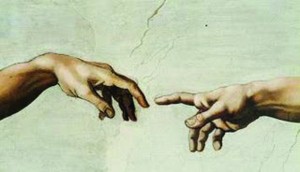Uniting the theology of the Body and the theology of love
Before the Fall, Adam and Eve’s bodies appear in perfect harmony. They have a language that they didn’t create, an eros rooted in nature that invites them to receive one another mutually from the Creator so that they might thus be able to give themselves.
The union in one flesh thus becomes a union of all of life, so that man and woman might become one spirit. In this sense”, he continued, “the virtue of chastity takes on a new meaning. It is not a “no” to life’s pleasures and joys but a great “yes” to love as the profound communication between persons, which requires time and respect, as a path together toward fullness and as love that becomes capable of generating life and generously welcoming the new life that is born”.
The Holy Father said that “the body also contains a negative language. It speaks to us of the oppression of the other, of the desire to possess and exploit. Nevertheless, we know that this language does not pertain to God’s original plan, but is the fruit of sin. When separated from its filial meaning, from its connection with the Creator, the body rebels against humans, and loses its capacity to show communion, becoming a place where the other is appropriated. Isn’t this”, he asked, “the drama of sexuality that today remains locked in the vicious circle of one’s own body and emotion, but which in reality can only be fulfilled in the call to something greater?”.
“God offers humans a path of redemption to the body, whose language is preserved in the family ...where the theology of the body and the theology of love are intertwined. Here the gift of self in one single flesh is lived in the conjugal love that unites spouses. Here the fruitfulness of love is experienced and life is joined with that of other generations. In the family, humans discover their relationality, not as autonomous individuals who are self-made but as child, spouse, and parent whose identity is based on being called to love, to receiving another’s self and to giving oneself to others”.
Prayer and the Hunger for God
VIS 511
“Humanity bears within it a thirst for the infinite, a yearning for eternity, a search for beauty, a desire for love, a need for light and truth, which impel us toward the Absolute.
We carry within us the desire for God.In some way, we know that we can turn to God, that we can pray to Him. St. Thomas Aquinas, one of the greatest theologians of history, defined prayer as ‘the expression of humanity’s desire for God’”.
Referring to prayer, the Holy Father noted that “it is an inner attitude before being a series of practices or formulas; it is a manner of being in God’s presence before the carrying out of acts of worship or speaking words. Prayer has its centre and sinks it roots in the depth of the person. That is why it is not easily decipherable and, for the same reason, why it can be the object of misunderstanding and manipulation. ... The experience of prayer is a challenge for all, a ‘grace’ that must be invoked, a gift of the One to whom we address ourselves”.
“In prayer, ... human beings experience themselves as creatures in need of help, incapable of attaining the fulfilment of their existence or their hopes alone. ... In the experience of prayer we orient our very souls to that Mystery from which we look for the fulfilment of our deepest desires and help to overcome the poverty of our lives. In looking to the Other, in directing ourselves ‘beyond’, is found the essence of prayer, the experience of a reality that goes beyond the apparent and the contingent”.
Benedict XVI affirmed that “even though human beings are forgetful of their Creator, the true and living God never stops calling humanity first to the mysterious encounter of prayer”.
“We must learn to spend more time in front of God, before the God who has revealed himself in Jesus Christ; we must learn to recognize in silence, within our very selves, his voice that calls us and leads us to the depth of our existence, to the fount of life and the source of salvation, so that we might overcome the limit of our lives and open ourselves to the measure of God, the relationship with He who is Infinite Love”.
Tagged as: Holy Father, Jesus Christ, Thomas Aquinas
Comments are closed.

 Entries(RSS)
Entries(RSS)